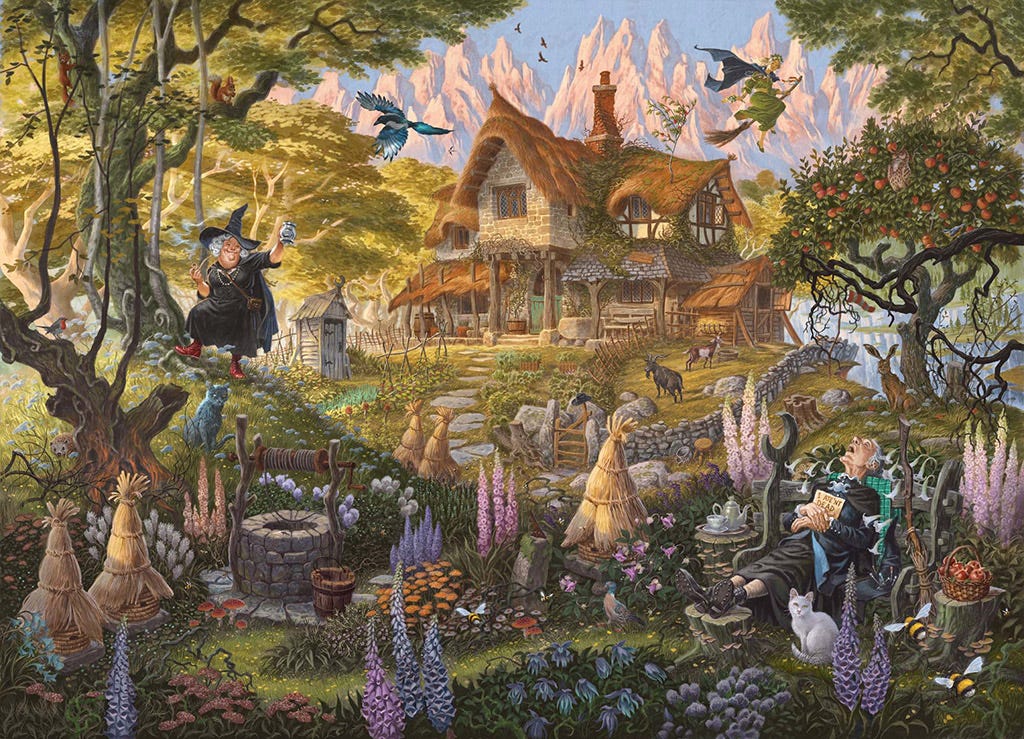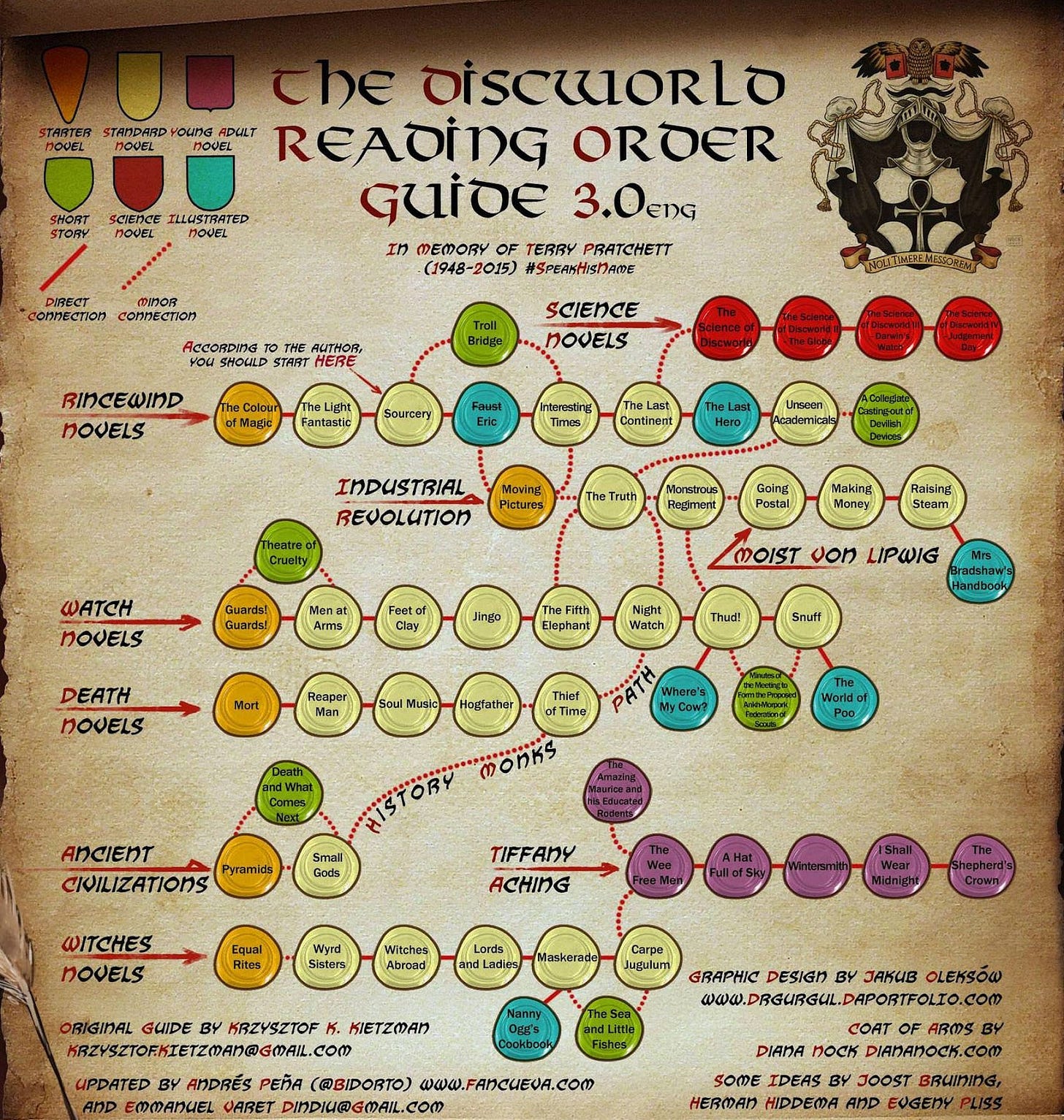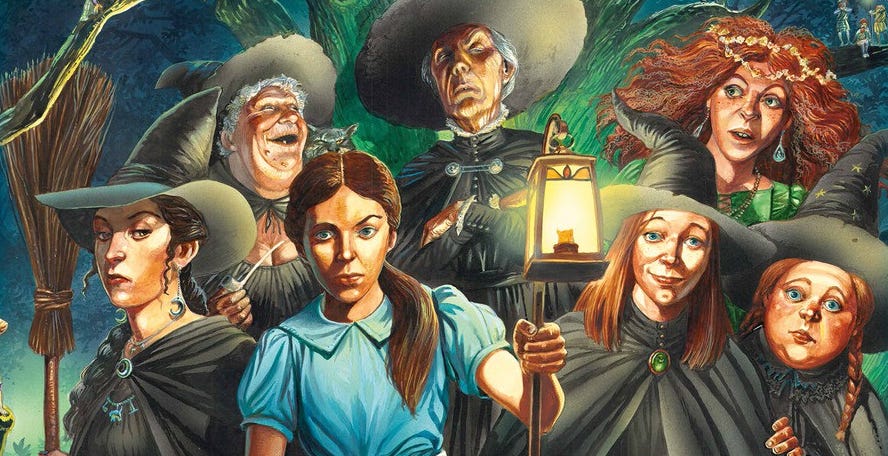My Week with the Witches
A trip to Terry Pratchett's Discworld, and the comforts of fantasy in world gone mad
Author’s Note:
I love writing this newsletter—or, well, I enjoy sending off the missives once I’m done agonizing over them, at any rate—and I love the independence and freedom to choose my own topics this platform offers me, without being tethered to the churn of the news cycle. However, in order to keep it sustainable beyond the next few months, I need more paid subscribers. If you’ve enjoyed the content thus far, want to toss a coin to your witcher, or feel that submerging my head in the acid of far-right nonsense deserves some compensation, please consider a paid subscription. I’ve lowered prices for the next three months to $5/month, though there are options to pay more if you like and want to support the endeavor!
The circumstances that gave rise to this piece are simple: I came down with a cold that could have been Covid again, and spent the week feverishly reading fantasy books, using fictional witches to dispel waves of all-too-real worry. I was exposed over Passover, and have spent much of the past few days in and out of hot, heavy sleep. The PCR test hasn’t come back yet, but until then I’ve put myself in protective isolation, hiding from my roommates, emerging only for water, soup, coffee and other fluids, a Schrödinger’s-illness state of depressive solitude. Most notably, my brain has been foggy as a London winter before air-pollution laws were put in place in the 1950s, back when Brits inhaled poisonous coal gas alongside the novels by Doyle and Dickens that used the “pea-soup” smog as a poetic backdrop. I find myself observing my own thoughts as if from the bottom of a deep well, reacting to stimuli that might provoke fear or anger with a faint watery echo, several leagues underground.
The feeling is both disconcerting and oddly comforting, like being swaddled in cotton wool, or held under warm water by a gentle hand, and breathing through a snorkel—not danger, but distance, from my own body and mind. This is a rare treat for a working writer: I am so used to mining my rather dull existence for content that I permanently perch on my own shoulder, uttering critical bons mots and taking notes for future use, in pain or contentment. That distance is, I think, what enables me to write about things, but it does delimit the immersive nature of experience in general, and I find myself often wondering what other people’s happiness is like, wishing I could study it up close, as if happiness were a new species of vole suddenly digging up the springtime streets. I assume that everyone but me has the capacity for uncomplicated happiness, and I would like to put it on a slab and dissect it to be certain—take a look at the translucent organs, the little bones, the venous hollows where happiness flows and circulates. Watching myself watching it, taking apart the way I take it apart, fretting from a still point about five inches above my body, trying to get at the anatomy of joy.
Besides imagining these muzzy hypotheticals, I spent the bulk of my Passover vacation in the twilight illness carves between sleep and waking. And most of that time, I spent fleeing to the Discworld. Having constructed a gnarled nest of too many blankets and pillows to enclose my body, I’ve turned to a prefabricated haven for my mind, laid out over forty-one books between 1983 and 2015.
The Discworld—“world and mirror of worlds”—is the invention of Sir Terry Pratchett, one of Britain’s most beloved authors, though significantly less popular this side of the Atlantic. I have no recollection of precisely how or when I stumbled on his work—it was sometime just north of adulthood—but when I fell into it I fell hard, sliding through novel after novel as if they were a long slope paved with clever and pleasant dreams. By then I was years out from my preteen all-consuming obsession with Tolkien, had put away Potter with other childish things, but Pratchett stuck to me and wouldn’t let go.
The series he conjured is sneaky—it starts out with rather creaky dad jokes and satire blunt as a plowshare and then stealthily gets under your skin, bit by bit, until you really care, against all odds, about the anthropomorphized Death, a con man who invents the postage stamp, and a ragged assortment of witches and watchmen. In the early books, you can practically feel the premises clunking into space—what if Macbeth was retold from the perspective of the witches?—what would the Grim Reaper do on vacation?—what if an entire novel was just a series of very broad jokes about Australia? But even in his most insubstantial novels, Pratchett turns a gimlet eye on human nature, one that is permanently fond, exasperated, and shrewd. In an interview appended to the novel A Hatful of Sky, he explained fantasy as a way “to take the everyday, commonplace world and lift it up and turn it around and show it to us from a different perspective, so that once again we see it for the first time and realize how marvelous it is.” At his best, Pratchett accomplishes this with aplomb, and evokes that kind of shiver in the soul that feels like betterment trying to be born. He makes you feel alive, and makes you think about what that means, all through the scrim of a flat world carried through the universe on the back of a giant turtle.
The Discworld books have a great many subseries—there’s not so much a “reading order” as a pleasant kind of anarchy, with any number of potential entry points, and books that follow clusters of characters as they develop, rather than any unitary narrative. For me, the most compelling set of characters are the Witches of the tiny, mountainous kingdom of Lancre: the dirty-minded, jolly Nanny Ogg, the flinty, complex Granny Weatherwax, and even the damp and sentimental Magrat Garlick, practicing a kind of magic that is more about the practicalities of life—birth and death and broken legs—than any twiddling of the fingers or bubbling of cauldrons. (This bears out from the first moments we meet the Witches, in the aforementioned Macbeth parody: “When shall we three meet again?” “Well, I can do next Tuesday.”) The narratives get complex—transmutations into bees, confrontations with evil elves and twisted fairy godmothers—but in between the witches attend to the laying-out of the dead, to the way the land of their tiny kingdom is born and dies again each year, to the salutary qualities of the placebo effect on the aches and pains of sundry villagers. Pratchett repeats over and over that witches live at the edges of things, in the half-moon place between life and death, birth and stillbirth, the mind and the body, and their chief role is to keep the fulcrum steady in its perilous balance.
In Pratchett’s excellent series about budding witch Tiffany Aching—aimed at younger readers, but only differentiated from the other Discworld books, to my reading, by the young age of the protagonist—this theme is elaborated on further. Witches are endowed with First Sight—where they see what’s really there, instead of the comforting and self-deluding narratives that so often cloak the supernatural or merely inconvenient from human eyes. And they have Second Thoughts: a part of them is always watching themselves, making sure their actions align with what they see, and what they ought to be. (Sometimes Third Thoughts—thinking about thinking—make their way in, too.)
It’s not a coincidence, to me, that Pratchett’s conception of a witch is not that dissimilar to what makes for a good writer. It’s the hovering above one’s own shoulder, it’s the relentless act of seeing and refusal not to see, that can make writing great; it is much harder to tell the story of what has really happened than to put forth a carapace of comforting and already-established ideas. That’s the trick Pratchett plays best of all: he takes what you think you know—witches, wizards, dragons, kings, all the archetypes and mythical building-blocks of the Western mind—and turns them forty degrees sideways, where they snag at your soul, all naggingly real, all truer than what’s true.
For a very long time I hid my affection for Discworld, and for other fantasy books (the works of Naomi Novik and Lois McMaster Bujold are new and wonderful additions to my mental library), as if enjoying what I read lessened the act of reading somehow. It’s not that I don’t enjoy other kinds of fiction—lines from Pere Goriot and Moby Dick, from M.F.K Fisher and Flannery O’Connor, from All the King’s Men and The Adventures of Augie March live in my head, too, murmuring to me as I go. But there’s a certain pull-your-socks-up book-club crowd that believes the most deadening MFA novel about male suburban angst outranks any volume with a dragon on the cover, that any book that does anything so impudent as playing with reality instead of rendering it in airless, solipsistic detail never really graduated from the kids’ table. It’s a view I subscribed to for a very long time (although Pratchett snuck his way in) and have only let go fairly recently. But revisiting the witches this past week, I felt them echo and surpass me, felt them making me grow, so much it hurt a little.
It reminded me of this: There’s a puissance to the refusal of comforting lies—they can trap you, after all, like food in Fairyland, or death in a dream—and to the observation of the self: watching yourself watching yourself all the time, so nothing drifts out of line. I still wonder about unselfconscious happiness, but if I can be a creature of the edges, an observer of the best and the worst of human nature, in the company of witches, then perhaps it isn’t such a bad thing to be. Terry Pratchett died eight years ago, to the devastation of millions of fans, and it never fails to catch at my throat when I think that there will never be a new Discworld novel (he had his unfinished works and sketches rather showily crushed by a bulldozer after his death of Alzheimer’s, lest they be dragged out and bowdlerized postmortem). It’s strangely cunning to bring joy to millions and live on forever that way—and sneakier to bring them self-knowledge, or tears, in the guise of a world set on a turtle where magic floats in the ley lines. But I think as long as the echo of his capacious mind reverberates in souls like mine, he’ll go on living, after a fashion—the way every writer longs to, that of the word that does not sleep and will not die.









I’ve been revisiting Monstrous Regiment one of my top few discworld stories. And I just love these misfit soldiers with genders so much. He so perfectly captures the discomfort of not quite fitting but not wanting to make a stand and stand out.
I've loved Discworld since university, picking up the first few books as they were published, while I was a postgrad student. When I emigrated from England to California in '99, my collection of Discworld novels were among the few possessions I took with me! I still occasionally wear my very old alt.fan.pratchett T shirt: on one side is Death at a computer asking "HOW DO YOU TURN OFF CAPS LOCK?" and on the other side is the Librarian at a computer with "ook" on every key and the screen covered in "ook! ook! ook!" text. Wherever I've introduced Americans to Pratchett, I've always done it through the witches' series of novels -- the "gateway drug" to full-on addiction to Discworld!